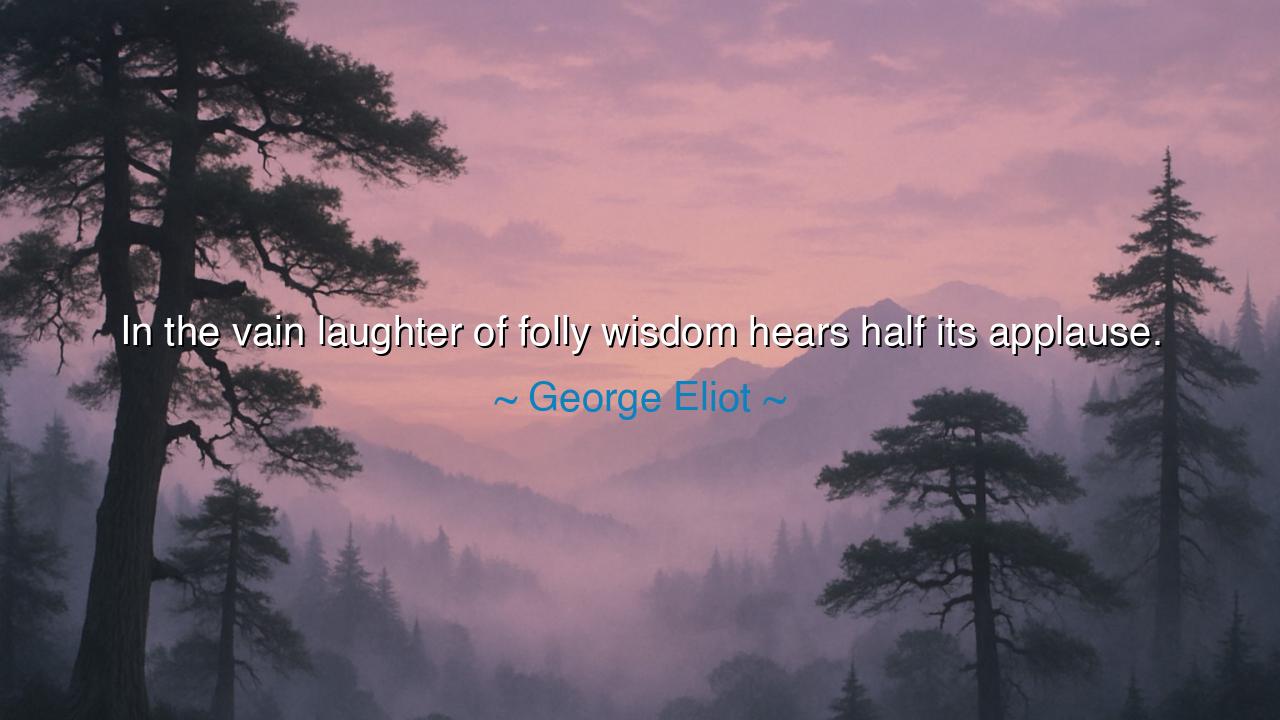
In the vain laughter of folly wisdom hears half its applause.






Hearken, O children of the ages, to the profound words of George Eliot, who reveals a truth both subtle and eternal: that in the vain laughter of folly, there echoes a portion of the applause rightly due to wisdom. She teaches that even amidst folly, where laughter rings shallow and unreflective, the discerning ear may perceive the resonance of truth, for all human mirth, however misguided, contains the shadow of recognition for that which is wise and enduring.
Eliot reminds us that folly often imitates wisdom, even unwittingly. Men may revel in trivial pursuits, mock what they do not comprehend, or celebrate the transient pleasures of vanity, yet in their mirth, they betray a longing, a recognition, or a shadow of that which is virtuous. Wisdom, attentive and patient, hears its reflection, discerning its presence even amidst error and frivolity, thus gaining a measure of influence where it seems none exists.
Consider the example of Socrates, who walked among the citizens of Athens, often mocked by the many for his relentless questioning. The laughter of the crowds, though born of confusion or derision, contained an echo of the very truth he sought to impart. In the seeming vain laughter of folly, his wisdom found its applause, influencing generations beyond the moment of jest, and proving Eliot’s insight: folly can unwittingly honor the wise.
Even in daily life, this principle endures. The teacher who is ridiculed by students, the thinker whose ideas are dismissed, or the artist whose work is mocked may yet find that in the laughter lies acknowledgment, however veiled, of the truth and value they convey. All applause is not direct, and all recognition is not explicit; wisdom hears, understands, and persists.
O children of the future, carry this teaching in your hearts: do not despair when your truth is met with mockery, nor shrink from folly’s laughter. Listen closely, for even in jest there may be applause, a quiet testament to the enduring power of insight. In patience, discernment, and humility, the wise gather strength, knowing that recognition often comes veiled, yet it is real, and it endures beyond the fleeting mirth of the moment.
If you desire, I can also craft a visual, ancient scroll-style presentation of this passage to capture the heroic, timeless, and deeply evocative essence of Eliot’s teaching on wisdom, folly, and the subtle recognition of truth.






DTDuc Trung
George Eliot’s quote makes me think about the irony in human behavior. People often laugh at what they don’t understand, yet that very reaction might hint at a recognition of underlying wisdom. Could it be that folly inadvertently validates insight, or is this more about the subtle ways wisdom permeates even the least appreciative audiences? How do we learn to notice and interpret these half-applauses in our own lives?
CLChuc Linh
I find this quote thought-provoking because it suggests that wisdom is resilient, even in the face of folly. The laughter of fools might mask understanding, yet it still gives a faint recognition to insight. Does this mean that truth and intelligence have a presence that persists regardless of how it’s received? How do we distinguish between genuine folly and the inadvertent nod to wisdom hidden within it?
KVLe Tran Khanh Vy
Eliot’s statement is fascinating because it hints at the paradox of human perception. Even when people behave foolishly, there’s a way in which wisdom is acknowledged, perhaps unconsciously. I wonder, is this a reflection of society’s inability to fully grasp wisdom, or is it a reminder that truth often exists in subtle, overlooked ways? How can we train ourselves to see the applause of wisdom even in contexts that seem purely frivolous?
CNChithanh Nguyen
This quote resonates with me because it implies that wisdom is often overlooked or undervalued, yet still subtly appreciated. The idea that folly’s laughter carries half of wisdom’s applause makes me think about how people sometimes mock what they don’t understand. Does this mean that ridicule can inadvertently confirm the truth or value of an idea? How do we recognize wisdom when it is wrapped in the seemingly meaningless chatter of others?
KDKhang Do
George Eliot’s quote makes me reflect on the relationship between wisdom and folly. It seems to suggest that even in moments of apparent foolishness, there is some subtle recognition of wisdom, even if it’s unintentional. I wonder, does this mean that wisdom is always somewhat acknowledged, even when people laugh at it? Or is it more about the idea that insight can exist quietly beneath the noise of folly, waiting to be noticed by those who pay attention?